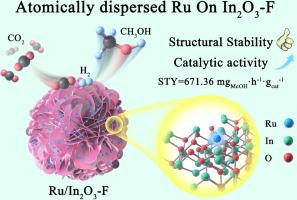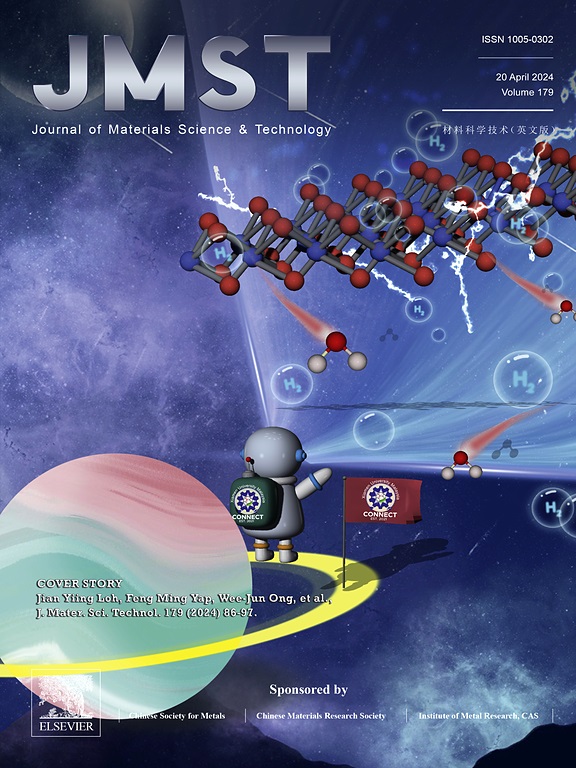Atomically dispersed Ru on flower-like In2O3 to boost CO2 hydrogenation to methanol
IF 11.2
1区 材料科学
Q1 MATERIALS SCIENCE, MULTIDISCIPLINARY
引用次数: 0
Abstract
Metal-based catalysts are prevalent in the CO2 hydrogenation to methanol owing to their remarkable catalytic activity. Herein, Ru/In2O3 catalysts with different morphologies obtained by doping Ru into In2O3 with irregular, rod-like, and flower-like morphologies are used for catalytic CO2 hydrogenation to methanol. Results indicate that the flower-like Ru/In2O3 (Ru/In2O3-F) exhibits higher catalytic performance than Ru/In2O3 with other morphologies, achieving a 12.9% CO2 conversion, 74.02% methanol selectivity, and 671.36 mgMeOH·h−1·gcat−1 methanol spatiotemporal yield. Furthermore, Ru/In2O3-F maintains its catalytic stability over 200 h at 5 MPa and 290 °C. The promotional effect mainly stems from the fact that electronic structure of Ru can be effectively adjusted by modulating the morphology of In2O3. The strong interaction between atomically dispersed Ru and In2O3-F enhances the structural stability of Ru, inhibiting the agglomeration of the catalyst during the reaction process. Furthermore, density-functional theory calculations reveal that highly dispersed Ru atoms not only perform efficient and rapid electronic gain and loss processes, facilitating the catalytic activation of H2 into H intermediates. It also enables the generated reactive H to rapidly overflow to the surrounding In sites to participate in CO2 reduction. These findings provide a theoretical basis for the development of high-performance catalysts for CO2 hydrogenation.

在花状 In2O3 上原子分散 Ru,促进二氧化碳加氢制甲醇
由于金属基催化剂具有显著的催化活性,因此在二氧化碳加氢制甲醇的过程中非常普遍。本文采用在 In2O3 中掺杂 Ru 而得到的不同形态的 Ru/In2O3 催化剂,包括不规则形态、棒状形态和花状形态的 Ru/In2O3 催化剂,用于催化 CO2 加氢制甲醇。结果表明,与其他形态的 Ru/In2O3 相比,花状 Ru/In2O3 (Ru/In2O3-F)具有更高的催化性能,可实现 12.9% 的 CO2 转化率、74.02% 的甲醇选择性和 671.36 mgMeOH-h-1-gcat-1 的甲醇时空产率。此外,Ru/In2O3-F 还能在 5 兆帕、290 ℃ 的条件下保持 200 小时的催化稳定性。这种促进作用主要源于通过调节 In2O3 的形态可以有效调整 Ru 的电子结构。原子分散的 Ru 与 In2O3-F 之间的强相互作用增强了 Ru 的结构稳定性,抑制了催化剂在反应过程中的团聚。此外,密度泛函理论计算显示,高度分散的 Ru 原子不仅能执行高效快速的电子增益和损耗过程,促进 H2 被催化活化为 H 中间产物。它还能使生成的活性 H 快速溢出到周围的 In 位点,参与 CO2 还原。这些发现为开发用于 CO2 加氢的高性能催化剂提供了理论基础。
本文章由计算机程序翻译,如有差异,请以英文原文为准。
求助全文
约1分钟内获得全文
求助全文
来源期刊

Journal of Materials Science & Technology
工程技术-材料科学:综合
CiteScore
20.00
自引率
11.00%
发文量
995
审稿时长
13 days
期刊介绍:
Journal of Materials Science & Technology strives to promote global collaboration in the field of materials science and technology. It primarily publishes original research papers, invited review articles, letters, research notes, and summaries of scientific achievements. The journal covers a wide range of materials science and technology topics, including metallic materials, inorganic nonmetallic materials, and composite materials.
 求助内容:
求助内容: 应助结果提醒方式:
应助结果提醒方式:


